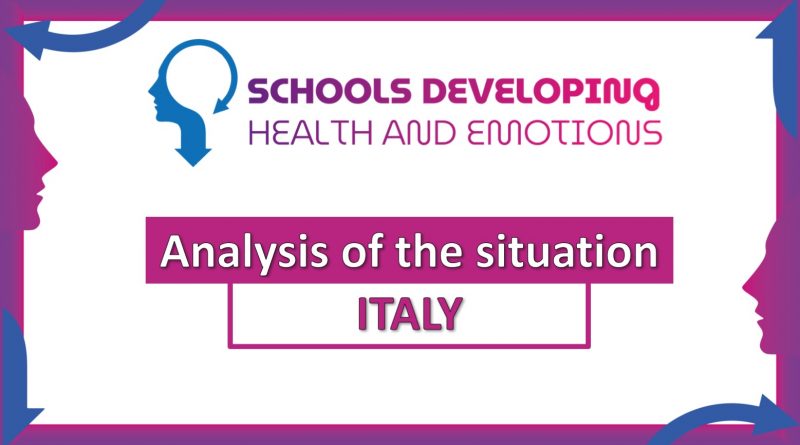Analysis of the situation: Italy
In the frame of Phase I, each project organisation had to analyse the existing situation on each project country on the promotion of health and emotional education in secondary schools and their institutionalization in its country. Here you have a summary of the text written by Università degli Studi di Palermo (UNIPA) concerning the situation of Italy:
Legislation:
The Italian education system is organized according to the principles of subsidiarity and autonomy of educational institutions. The legislative competence of the State exclusively concerns the “general rules on education” and the definition of the essential levels of services that must be guaranteed throughout the national territory.
The education system is organized into:
‑Zero-six year integrated system;
‑First cycle of education;
‑Second cycle of education.
The national guidelines for each grade state that each school must establish its own school curriculum to be included in its learning program.
In Italy, the relationship between the school and health system is regulated by the document “Integrated policy guidelines for health-promoting schools” (State-Regions Agreement January 17, 2019), where it is highlighted how interconnected health and education are.
Whereas in the past, health education in schools was entrusted to external parties, often social-health entities, according to a thematic approach in which various areas were addressed separately, today a “Comprehensive School Approach” is adopted, as recommended by the WHO.
With Bill n. 2782 entitled “Provisions on experimenting with emotional intelligence education in schools of all levels,” approved on Jan. 11, 2022, almost unanimously by the Chamber of Deputies, it is planned that experimentation with new teaching methods that enable the development of emotional competence will be launched in secondary schools of first and second grade. The bill does not envisage an increase in teaching hours, but a revision of teaching practice, aimed at having students develop life skills, which the WHO had defined in 1993 as those skills that enable the individual to cope effectively with everyday demands, such as Self-awareness; Emotion Management; Stress Management; Effective Communication; Effective Relationships; Empathy; Creative Thinking; Critical Thinking; Decision Making; Problem Solving.
Implementation:
Each school exercises its autonomy granted by law (art. 21, Law n 59/1997) by adopting an internal school regulation, which represents the reference regulatory text of each school. This autonomy consists of didactic, organizational and research autonomy (Presidential Decree n ° 275/99), plus some elements of financial and managerial autonomy (for which there is still no specific regulation).
On a practical level, as supported by the document “Integrated policy guidelines for the School that Promotes Health “, the opportunity for schools to include key competences in their curricula allows students to acquire greater decision-making autonomy, necessary for better personal development, social inclusion and active participation as aware citizens.
On a practical level, specifically, the proposed law n.2782 « aims to introduce, in schools of all levels, the curricular hour of emotional intelligence to effectively combat bullying, educational poverty, school dropout and other deviant phenomena, favoring the recovery of lost emotional vocabulary, the improvement of the relational climate, both among pupils and students and within the educational holding, among pupils, students, teachers and families, the improvement of environments of learning, the relaxation of relations between schools and families and the prevention of cases of isolation and early onset of pathologies among adolescents.
Training of Teachers:
The teacher’s training course in Italy includes two steps:
‑Achievement of the qualification for access to teaching (Diploma, Degree, etc.);
‑Achievement of the teaching qualification.
For the first and second grade secondary school the required admission qualifications are as follows:
‑Old Order Degree, New Order Specialist or Master’s Degree, Second Level Academic Diploma, Conservatory or Academy of Fine Arts Diploma Old Order DPR 19/2016 and DM 259/2017;
‑High school diploma (for technical-practical courses) DPR 19/2016 and DM 259/2017 12

